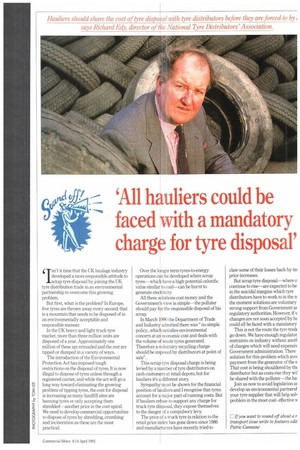'All hauliers could be faced with a mandatory charge for tyre disposal'
Page 51

If you've noticed an error in this article please click here to report it so we can fix it.
1
g set it time that the UK haulage industry
developed a more responsible attitude to scrap tyre disposal by joining the UK tyre distribution trade in an environmental partnership to overcome this growing problem.
But first, what is the problem? In Europe, five tyres are thrown away every second: that is a mountain that needs to be disposed of in an environmentally acceptable and responsible manner.
In the UK heavy and light truck tyre market, more than three million units are disposed of a year. Approximately one million of these are retreaded and the rest are tipped or dumped in a variety of ways.
The introduction of the Environmental Protection Act has imposed tough restrictions on the disposal of tyres. It is now illegal to dispose of tyres unless through a registered carrier, and while the act will go a long way toward eliminating the growing problem of tipping tyres, the cost for disposal is increasing as many landfill sites are banning tyres or only accepting them shredded—another price in the cost spiral. We need to develop commercial opportunities to dispose of tyres by shredding, crumbing and incineration as these are the most practical. Over the longer term tyres-to-energy operations can be developed where scrap tyres—which have a high potential calorific value similar to coal—can be burnt to generate electricity All these solutions cost money and the Government's view is simple—the polluter should pay for the responsible disposal of his scrap.
In March 1990 the Department of Trade and Industry admitted there was no simple policy...which satisfies environmental concern at an economic cost and deals with the volume of waste tyres generated. Therefore a voluntary recycling charge should be imposed by distributors at point of sale".
This scrap tyre disposal charge is being levied by a number of tyre distributors on cash customers at retail depots; but for hauliers it's a different story.
Sympathy must be shown for the financial position of hauliers and I recognise that tyres account for a major part of running costs. But if hauliers refuse to support any charge for truck tyre disposal, they expose themselves to the danger of a compulsory levy The price of a truck tyre in relation to the retail price index has gone down since 1986 and manufacturers have recently tried to
claw some of their losses back by irs price increases.
But scrap tyre disposal—where o continue to rise—are expected to be in the suicidal margins which tyre distributors have to work to in then the moment solutions are voluntary strong support from Government at regulatory authorities. However, if v changes are not soon accepted by ht could all be faced with a mandatory
This is not the route the tyre trade go down. We have enough regulator restraints on industry without anotl of charges which will need expensiv Government administration. There solution for this problem which avoi payment from the generator of the s That cost is being shouldered by dm distributor but as costs rise they wil be shared with the polluter—the hat Join us now to avoid legislation ar develop an environmental partnerst your tyre supplier that will help soh problem in the most costeffective v












































































































